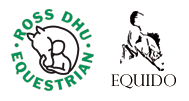As the seasons come and go, your horse’s nutritional needs will change, requiring some adjustments to his diet to help keep him fit and healthy. The team at Ross Dhu, have put together a seasonal feeding plan checklist to help you for your and your best friend.
Spring
- Check whether your horse needs to gain or lose weight?
- Gradually allow horses that have been stalled time to adjust to the rich grass.
- Keep founder-prone horses and ponies off spring grass.
- Use grazing muzzles on other easy keepers.
- Put out trace mineral salt blocks to round out an all-pasture diet.
- Horses without access to good pasture that need to gain weight will need increased hay amounts and a commercial concentrate feed.
- Make sure that your horse has access to clean drinking water.
Summer
- Monitor your horse’s weight with increased exercise and decreasing pasture quality.
- Make sure buckets and troughs are filled with clean water at all times to meet higher demand and prevent impaction colic. Note; Water must be kept out of the sun or it will be too hot to drink.
- Always provide a source of salt, either loose in a free feeder or block form.
- You can supplement with electrolytes in extremely hot/humid climates (not always necessary in Scotland!) or for horses in heavy work that sweat excessively.
- Order enough hay for the winter during one of the summer cuttings; you’ll get the best price and avoid shortages that occur when the growing season ends.
Autumn
- Strive to put weight on harder keepers before cold weather sets in.
- If needed, add commercial concentrate feed (mixed grain or fat & fiber) for faster weight gain.
- Always, always make sure there is access to clean, fresh water.
Winter
- Keep diet balanced with a ration balancer or vitamin supplement if not feeding a commercial concentrate.
- For every 10-degree drop below “critical temperature” (15-30 degrees F), horses need an extra 15-20% more food.
- If body clipping and/or blanketing, your horse may need more or fewer calories depending on his situation.
- More time in the stall can lead to stress and ulcers, so it’s especially important to keep hay available to buffer stomach acids.
- Seniors with worn teeth may need soaked need hay cubes or hay pellets as their primary feed when grazing dries up.
- Make sure unfrozen water is available at all times, breaking up ice twice a day or using trough heaters.
For more information please feel free to call Morag on 01698 886 492 or email on contact@scottishhorsehelp.com.
